Why is desperately needing a relationship toxic for a relationship? In our modern culture, not being in a relationship ends up causing a man to be labeled as “having a problem.”
His parents are worried. They don’t miss a chance to ask him if he’s dating anyone. His friends are trying to help by setting him up on dates with every girl they meet in Starbucks. And his grandmother is lining up nurses at the hospital immediately after her stroke (true story). There’s a subtle undertone that being a single man means you have major issues.
This fear and anxiety can lead to some pretty toxic beliefs about one’s worth.
If you count dating in the fourth grade, that’s when I started. It entailed holding hands at the skate deck and occasionally playing jump rope. As I got older, hugging my current girl really intensified the situation.
Then tongues jammed down my throat. My butt got grabbed. Girls started admitting they looked up my shorts during gym class.
As I started puberty, I found myself in relationship after relationship. Maybe it was because I was physically attractive and known as the “six-pack” kid, or maybe because I had some other feature that my shy self couldn’t recognize. Regardless, I had nine years of relationship after relationship.I only had 3 weeks in a row of being single until I was 25.
When one relationship ended, I put on my game face and jumped into the field of love to find another girl.
Looking back, I can recall intense anxiety of being alone.
Related: 8 Steps To Improving Your Self-Esteem
This fear of being single and seeing everyone else in a relationship made me feel inadequate. I didn’t just want a relationship. I desperately needed one to feel good about myself.
In fact, after my college sweetheart ended things, I spent 2 months searching for the next girlfriend. I would go out every Friday and Saturday night with buddies; not to spend time with them, but to use them as social proof that I wasn’t some loser frantically searching for the next girl. I would average 3-7 numbers a night, and usually, a few make-out sessions. The moment the bar I was in was filled with women I had already talked to or had no desire for, I grabbed my buddies and we went to the next one. Talk. Get Number. Repeat.
At the time, despite my deep insecurities filling me with anxiety, I felt like the MAN. I was going on dates at least 3 times a week, and on average, seeing 3-5 different women at the same time. My friends used to laugh because they couldn’t keep the names straight of all the women I was spending time with.
At some point, I met a woman that I found more attractive than all the rest, so I stopped talking to the others. We dated for about a year. I felt I was inferior to her beauty and as a result, I acted extremely needy. Inevitably, this leads to her ending things with me.
That’s when shit hit the fan. I felt a gaping hole inside and was I determined to fill it. So I went crazy and started sleeping with tons of women, hired a few mistresses, and was kissing practically any girl that looked my way.
When our self-worth becomes extrinsically tied to our relationships, we’re giving the people we date the responsibility of making us feel good about ourselves, even though this person has never experienced our own life in our perspective before.
We place the key to our happiness in someone else’s pocket.
Our relationships become the external validation we need to feel worthy. For other guys, it’s the amount of money, the six-pack, or the Porsche. This external validation leads to neediness and insecurities within a relationship.
Of particular concern is the consistent finding that, although those with low self-esteem want affirmations from partners, their self-doubts translate into relationship insecurities. 1
The Self-Worth Meter
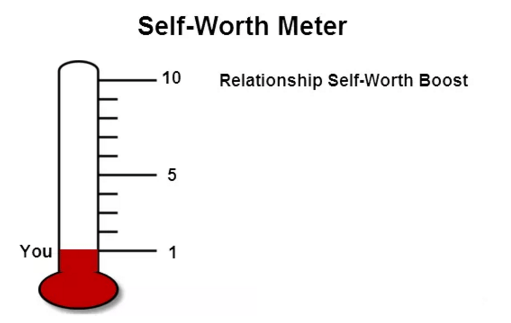
Let’s say this is me. I’m a pretty harsh judge of the quality of my life. If I was scoring myself, I’d give myself a score of 1.
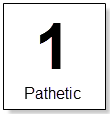
To me, it’s not good enough. I don’t have the gorgeous girlfriend who turns heads as she walks by. She’s bursting with charm and charisma, lighting up every room she enters. She’s the rising star in her career and cherished by all her friends. And that’s just her public persona – at home, she’s mind-blowing in bed, an amazing cook, selfless, and devoted. 2
Until recently, one of my top priorities was to have a girlfriend. It was what I valued most. As a result, I was willing to sacrifice all other things to get and keep a girl. So when I met a girl who gave me her number, I got a boost in self-worth. When she texted me, my self-worth was boosted up to one point.
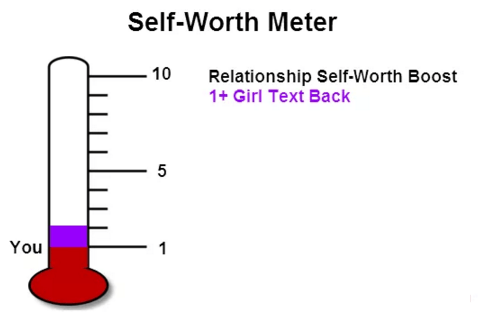
Getting texted by this girl fit in my goal of getting and keeping a girlfriend. So when I get a text, my meter goes up. As you can tell, it’s not red. That’s because my intrinsic self-worth has not changed. Rather, I’ve leached off this girl and used her value to make myself feel better. I stole my perceived worth of her to make my self-worth higher. The problem is, when it goes away, I’m back down to one.
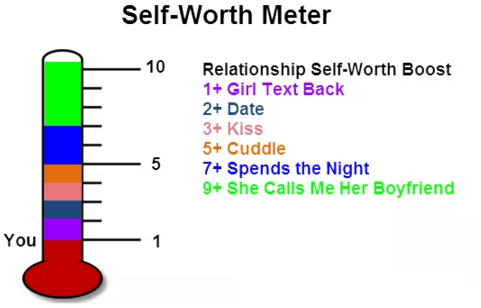
Same thing with dates, kisses, sex, and so on. The closer I get to my goal, the better I feel about myself. This how my relationship with my ex was before I got sick. When she texted me, I felt good.
When she was too busy to respond, I felt insecure. When she let me come over and see her, I felt on top of the world. If she told me she wanted to have a night to herself, I felt like I was doing something wrong.
Related: Self-Abuse: Are You In An Abusive Relationship with Yourself?
Since my self-worth was contingent on my intimate relationships, I was highly motivated to pursue short and long-term goals that enhanced or promoted that aspect of my life. In fact, people like me who use their relationship as a validation of their self-worth want to prove to themselves that their relationship is a success. They need that success because it validates their sense of self.
All I was doing in these relationships was taking the woman’s value to fill up the empty holes in my heart, because I believed that I was unworthy as a human being.
Some guys try to use other things like drugs, cars, money, sex, and alcohol to fill up their meter, but it doesn’t last. In fact, it never lasts, because you can never feel good about yourself if you believe at your core that you are a piece of shit.
For me, any Relationship Self-Worth Boost I got made me feel good. It was like taking a hit of heroin, but those good feelings about myself went away the moment she did. It left me itching, running, and chasing my next hit. The higher I got, the worse I felt when I lost it. Dropping from a 10 to a 1 has a far worse relapse than dropping from a 2 to a 1. For me, it was absolutely devastating.
The culture we live in places the idea of self-reliance and meritocracy in our heads and may lead us to believe that our self-worth must be earned by performance and attainment. It makes us believe that some people are worthier than others. 3
But I want you to take a moment and look at the world. Isn’t there evidence that getting things doesn’t make you happy? There are studies that show getting more money beyond our basic needs doesn’t make us that much happier. But at the same time, millions of men suffer tremendous anxiety and health issues from working 80 to 100 hours a week to buy things they don’t even use.
How many guys do you know that have a beautiful wife, successful kids, a big house, and loads of money, but are still miserable? They still don’t feel good enough. They still view themselves as inadequate.
Getting results will never fix intrinsic beliefs you have about being unworthy.
How This Affects Us and Our Relationships
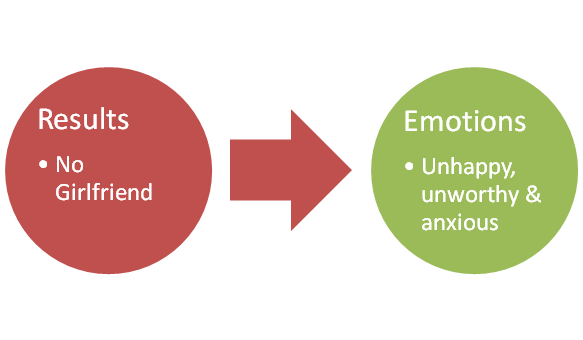
Our thoughts affect our emotions. Our unconscious makes irrational and snap judgments about what is going on, which triggers our emotions. Our conscious mind attempts to put a story as to why we feel the way we do, which can be wrong at times. The reason we feel anxious, unworthy, and unhappy is because of our thoughts.
It’s how we think and feel about ourselves, which comes from the comparison of our real self to our ideal self, and choosing that we are lacking our ideal characteristics or possessions.
The problem when we feel unhappy, unworthy and anxious, is that we don’t talk to women. We don’t take the opportunity to ask them out. It’s not the result that affects our emotions; it’s our thought process.
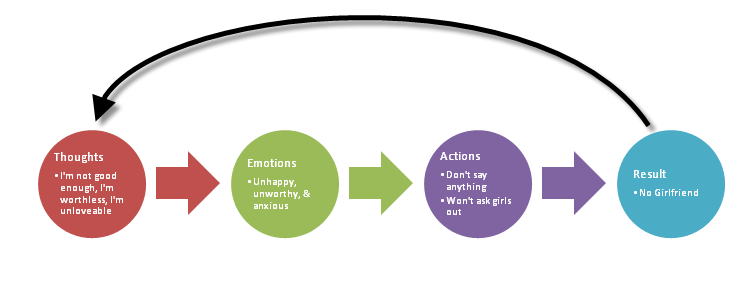
To actually improve our lives, we must tap into our subconscious and transform our beliefs about who we are. We must change the stories we tell ourselves, to ourselves, about ourselves.
If we don’t and we end up in a relationship, we end up sabotaging it.
Let me explain:
When I got into a relationship with my ex, I got the thought I’m loveable! Yay for me.
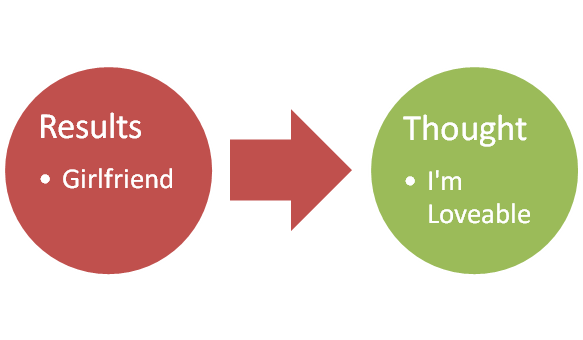
But I still have the original beliefs about myself.
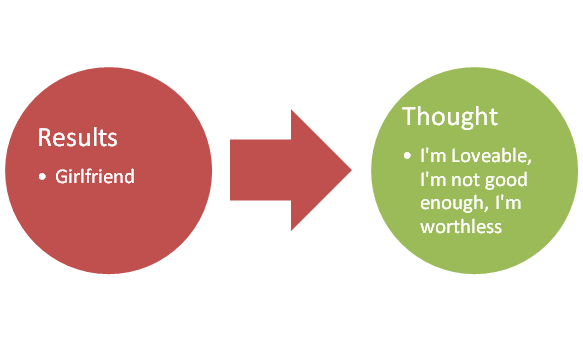
Despite having the girl, I still have the old memories of not feeling cool enough in my youth. I still remember sitting alone at a lunch table. All of these thoughts still pop up in my head, and what ends up happening isn’t pretty.
Remember, my self-worth is at a ten right now because of this girl. So the thought of not being enough makes me scared of losing my Level Ten self-worth. If I lose her, I will be pathetic. Since I am extremely motivated to protect and enhance my self-esteem, I became obsessed and preoccupied with making the relationship work. 4
Related: 6 Life Changing Steps To Practice Mindful Self Compassion
I used sex as a driver to create approval rather than more intimacy between us. Thus lowering sexual autonomy and my own satisfaction.
I avoided negative situations and increased positive ones by catering to my girlfriend’s wants and needs at the expense of my own. I lost more of my autonomy in the process.
I put tons of stress on myself to please her, and felt anxiety anytime I wasn’t able to drop everything and be there for her.
The problem with this self-perception is I viewed losing the relationship as a threat to myself. I acted out of fear rather than confidence and self-expression.
The problem with these insecurities caused by our low-self esteem and attachment style is we are less able to seek the support and care we need in an effective way. I would see her texting guy friends and interpret that as a signal that she was going to leave me. That idea caused me to be manipulative and needy to gain the reassurance I wanted.
Both men and women who place their self-worth in the hands of their relationships are highly sensitive to rejection 5. At times, I went batshit crazy on her ass because I was so scared of being rejected. In fact, I was anxiously expecting rejection on a regular basis. I wanted a guarantee that she wasn’t going to leave me devastated with my low self-worth, and I’d do anything to make that happen.
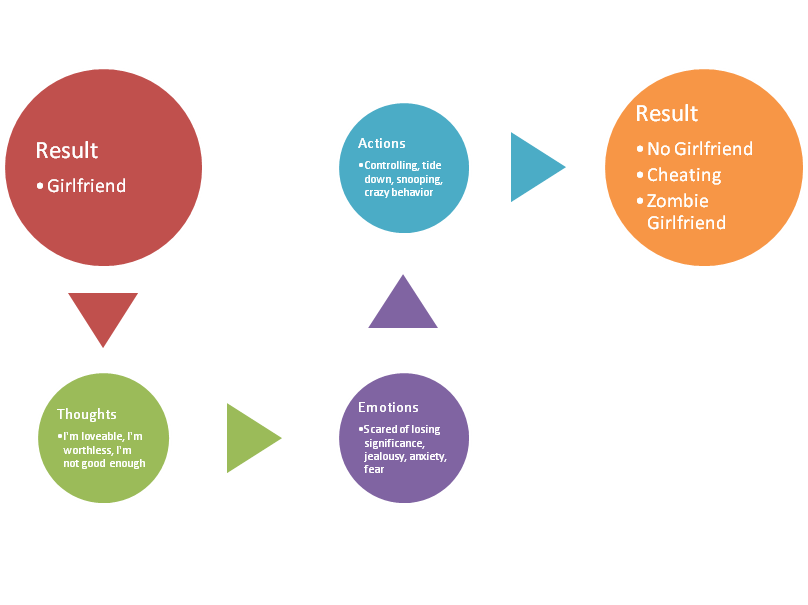
This fear and insecurity lead to jealousy and anxiety. We want to control her. Our preoccupation with the relationship drains the emotional connection we had when we started it because we place a TON of pressure to keep the relationship working well, and this ironically leads us to diminish our ability to empathize with the person we are dating.
We tell her she can’t go out with her friends to the clubs or grab a drink with a guy friend. We start snooping and monitoring her, trying to make sure she isn’t doing what we fear she is doing.
We display excessive reassurance-seeking behavior, which can be a source of strain on the relationship. Some guys even control what their girlfriend eats to make sure the girl they date fits his ideal type. 6
Some guys get married right away, because they are so desperate to tie down what they just got.
The problem is that this behavior ends up causing the girl to leave you, or cheat on you. Or you’re going to cut her down so much that she will be a shadow of what she was.
If the latter happens, you no longer have a girlfriend, you have a zombie. You’ve killed her personality with your insecurity, your low self-esteem, your anxiety, and your fears.
The reason you cause all of this drama and all of this pain is that you placed your key to your happiness in her pocket. Not yours. There is not a single person that can be there 100% for you.
You may have already uncovered that immediately after the relationship I talk about above, I got really, really sick.

I was forced, for two years, to deal with my health, my beliefs, and my self-worth issues. Research has shown that the anxiety and stress associated with dependency and self-worth can lead to long-term physical and mental health problems. 7
This is a byproduct of the anxiety and stress activating the pituitary-adrenal-cortical system, which leads to numerous health issues. It also leads to unhealthy attempts at coping.
During the “friends with benefits” stage at the end of the relationship, as well as my time being single, I found myself struggling to sleep. So I would hop on the Internet and try to find girls to sleep with. I would text any girl who I thought would come over, and when I didn’t succeed, I was only able to sleep after having a few drinks.
Related: Self-Compassion And Meeting Yourself Where You Are
Research shows that people who are more concerned with how others evaluate and perceive them tend to do all sorts of unhealthy things. And in spite of doing them, the person is still lead to depression.
I highly doubt you’ll get as sick as I was, but I share these horrible experiences so you don’t have to deal with the pain I suffered, the money I spent, or the thoughts of suicide I had.
The anxiety and fear of not being enough are toxic to our relationships. Most importantly, they are toxic to us. I can’t tell you how many doctors said my problem stemmed from toxicity in my body and severe emotional patterns. I wholeheartedly believe that my low self-esteem and perception of myself lead to my downfall.
What I’ve come to realize is you cannot go out and meet girls with the hopes that this one will make you happy, or that one would be perfect for you. You need to make yourself happy first so you’re coming from a place of non-neediness, not insecurity. Instead, you’re offering value to her versus taking value from her. She should be the same way with you. That’s an authentic and healthy relationship.
We must fill up our own meter
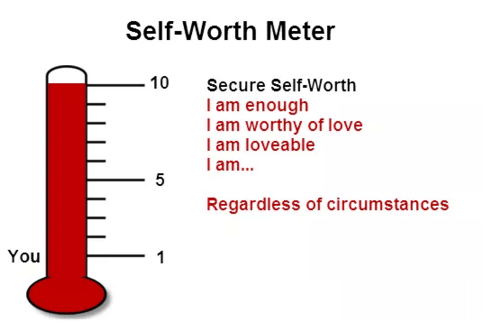
Low-self esteem comes from comparing ourselves and deciding our value. It’s our decision to accept the self-created belief that we are worthless. Not anyone else’s decision. It’s your image in your head that is causing you to compare your real self to your ideal self. You created that.
So what’s the solution?
1. Transform how we measure ourselves from external sources to internal sources.
This is achieved by redefining success, transcending limiting beliefs, and developing a growth mindset that cumulates in changing the way we perceive ourselves: our identity.
The benefit is this not only makes you happier, but it improves the quality of your relationships because you’re no longer using your partner. Rather, you’re choosing to be with them consciously. By shifting our source of self-worth from approval to compassion towards others, minor setbacks in a relationship are not alarming because they no longer threaten your sense of self.
This allows you to be vulnerable about what you need and allows you to create growth fostering a relationship with your partner that encourages both of you to reach self-actualization. To sum it up, it’s beautiful, bro.
Related: 12 Tips To Self-Love And Compassion
2. Develop self-compassion.
People with low self-esteem go Mike Tyson on their own ear. Dreading themselves, causing doubt and even undermining their self-confidence.
I’ve struggled with this for years. This voice stems from our comparison to our ideal self.
As men, it’s weird for us to be compassionate towards ourselves. To love ourselves. I mean, we’re men. We don’t need that kind of fuzzy stuff. If we wanted that, we’d go pet a damn bunny.
As much as I like the concept of manhood, the degrading nature of masculinity causes us to reject parts of ourselves. It wasn’t until I learned to be compassionate with myself that I began to build my self-esteem and feel better.
Self-compassion allows you to nurture your “I’m pathetic” mindset with self-kindness, rather than more harsh judgment. For me, I had to tell myself that many other men struggle with what I struggle with. It gave me a sense of humanity rather than I am an isolated man off to battle the world by myself. 8
When you use self-compassion and experience an event that causes you to harshly judge yourself, you become gentle towards yourself. You recognize that you are not alone. Rather, all people suffer at some point or another. The amazing thing is by developing self-compassion for yourself, you develop self-compassion for other people in your life. As a result, your relationships become much deeper and more meaningful.
Before I go, I want to make this very clear – no woman will make you happy if you are first not happy with yourself.
If you want to transform conflict into material to build a stronger and more connected relationship then read Kyle Benson’s conflict blueprints here.
References:
Murray, S.L., Holmes, J., MacDonald, Ellsworth P., (1998) “Through the Looking Glass Darkly? When Self-Doubts Turn Into Relationship Insecurities. Journal of Personality and Social Psychology, Vol.75, No.6, 1459-1480. ↩ Oh, how ridiculous inhuman fantasies can be. ↩ Crocker, J., & Park, L. E. (2004). The Costly Pursuit of Self-Esteem. Psychological Bulletin, 130(3), 392-414. ↩ Crocker, J., & Knight, K. M. (2005). Contingencies of Self-Worth. Current Directions In Psychological Science, 14(4), 200-203. ↩ See Footnote 3 ↩ This is toxic and emotional abuse. ↩ I believe my view of myself within my relationships caused my health issues. See Footnote 3 for research. ↩ Neff, K. D. (2003). Self-Compassion: An Alternative Conceptualization of a Healthy Attitude Toward Oneself.Self And Identity, 2(2), 85-101. Also check out Dr. Kristin Neff’s Self-Compassion exercises here. They have really helped me and some of my clients. ↩
Written by Kyle Benson Originally appeared in Kyle Benson
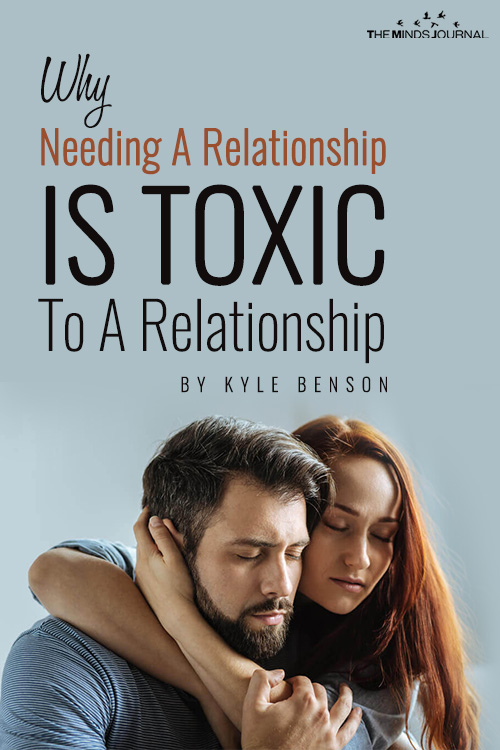
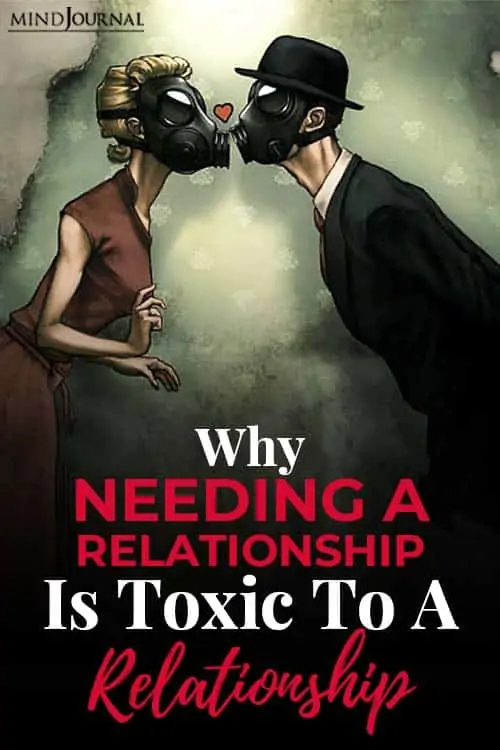
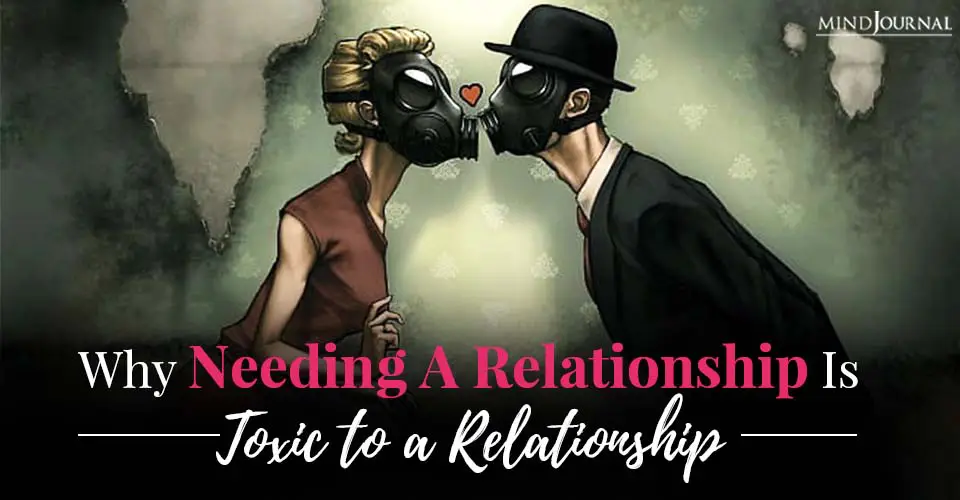
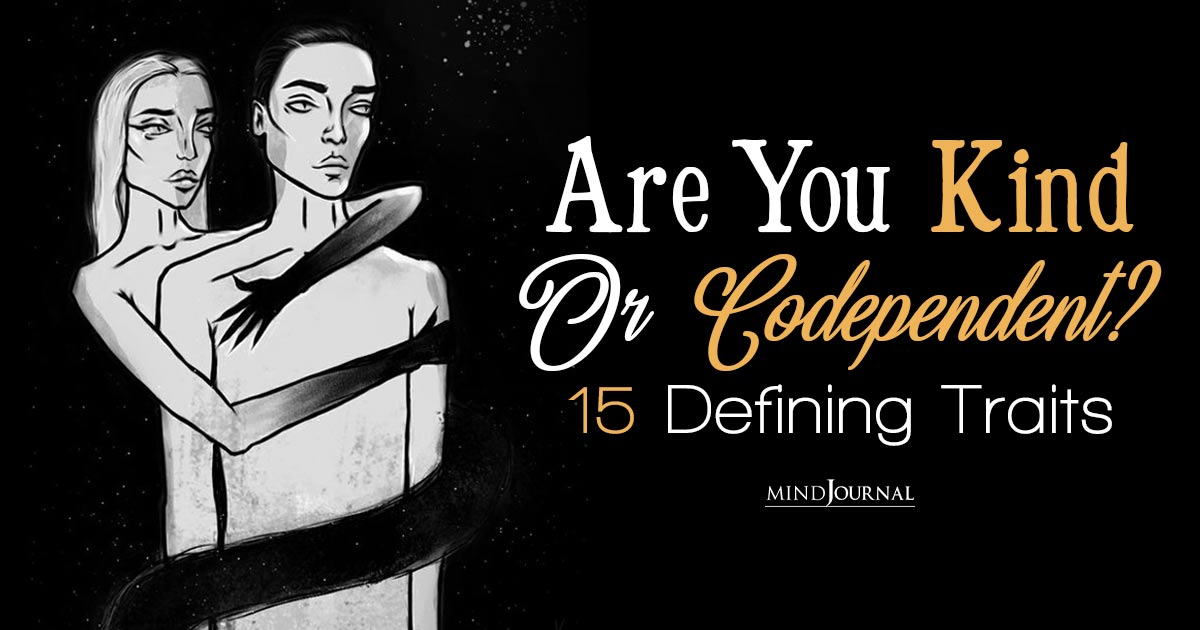
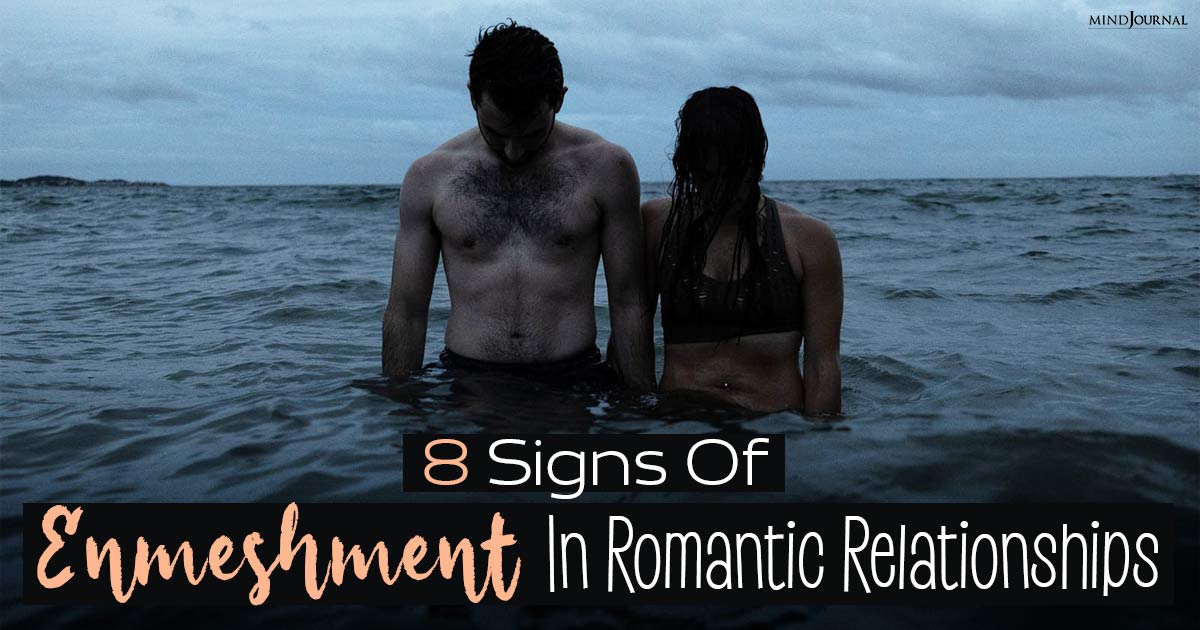
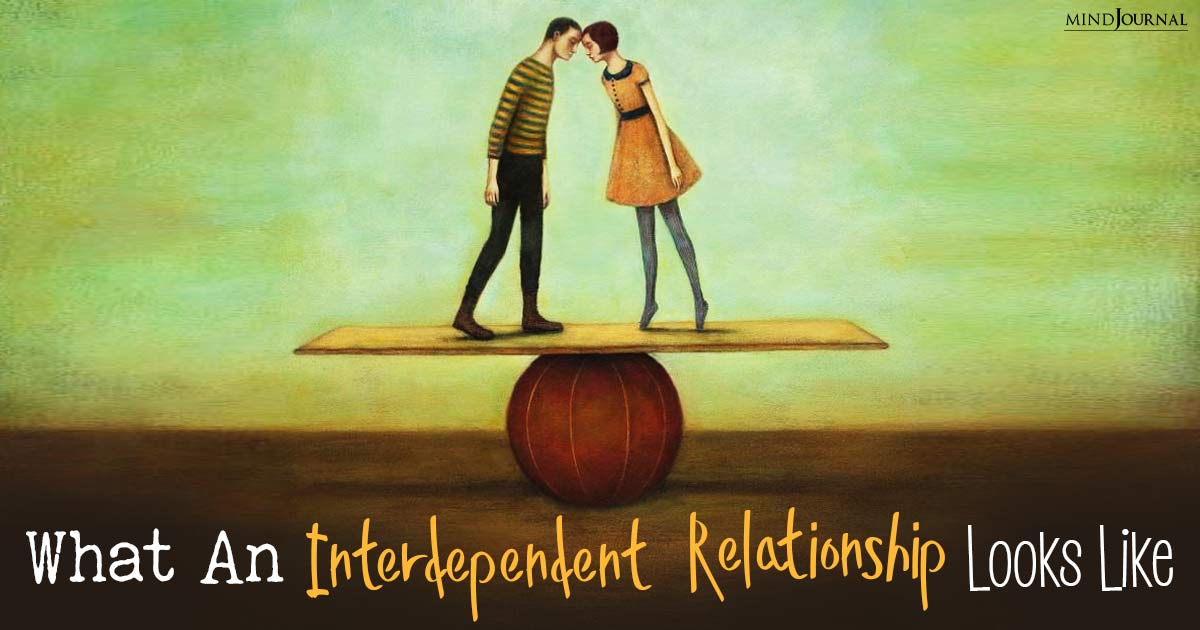
Leave a Reply
You must be logged in to post a comment.